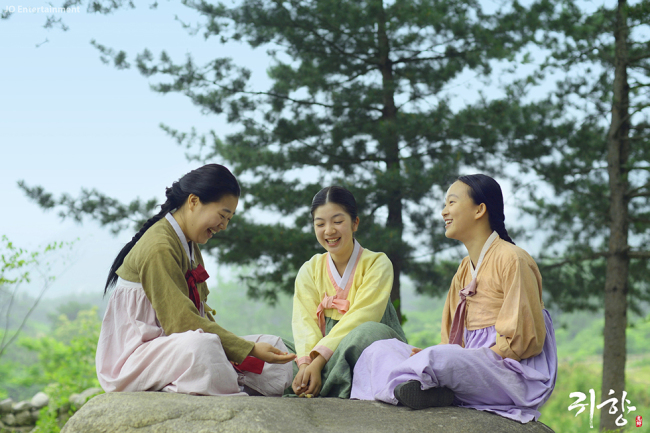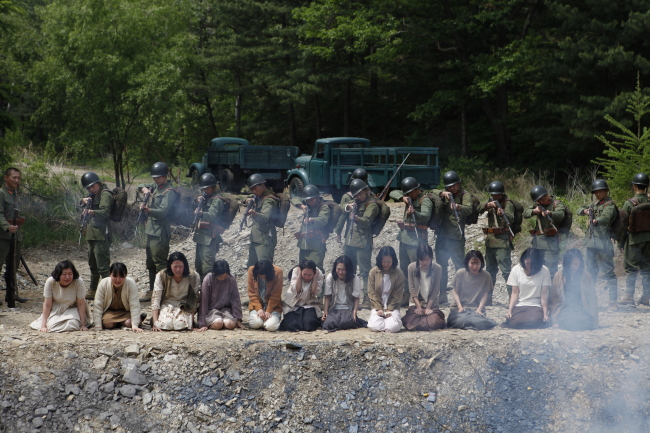Indie director Cho Jung-lae’s film “Spirits’ Homecoming,” about the ordeals of the former euphemistically labeled “comfort women,” has been in the making for nearly a decade and a half, written and prepared independently of the ever-changing tide of Korea-Japan relations.
After years of struggling to secure investors and a distributor, the film is finally getting a theatrical release -- right when the issue of the Korean women who were forced to serve as sex slaves for Japanese troops has come back to the fore.
“I hope that viewers will see the movie as a human drama, rather than a reflection of a political issue or a Korea-Japan issue,” director Cho Jung-lae told reporters at the media preview early this month.
But that seems difficult to realize in the current political climate. On Dec. 28 last year, the governments of Korea and Japan agreed to settle the drawn-out, ever-contentious issue of recognizing the state crimes committed against these former sex slaves.
 |
Still from "Spirits' Homecoming" JO Entertainment |
In the agreement, Japan offered an apology and a fund of 1 billion yen ($8.8 million) to support the 46 remaining surviving victims -- but these actions fell far short of what the victims themselves would recognize as proper compensation.
Anger over the agreement would most likely be exacerbated by “Spirits’ Homecoming,” which depicts girls as young as 13 kidnapped and taken to military brothels, as well as girls executed in groups and their bodies burned unceremoniously by the Japanese soldiers.
 |
Still from 'Spirit's Homecoming' JO Entertainment |
Throughout the movie, countless girls are seen being slapped, humiliated and raped and, although the film is not explicit, the scenes are shocking enough to make vivid the testimonies of former comfort women that have been heard by almost all Koreans today.
Cho himself first began talking to the former sex slaves while volunteering at their shelter, the House of Sharing, as a musician in 2002. He was shocked when he saw a picture labeled “Burning Virgins” drawn by one of the victims during a therapy session, in which a group of girls are seen burning in a pit, with more girls on the way. That led him to write the script for “Spirits’ Homecoming” based on the surviving victims’ testimonies, and to begin searching for investors.
Unfortunately for Cho, investors were wary of offering funding for a film dealing with a still-hot political issue, and the film languished for many years before he decided to try crowdfunding. With a minimal budget, Cho was able to create a short teaser video, which eventually brought in donations from 75,270 people around the world.
With this public support and the nearly no-pay dedication of the actors and production staff, Cho hoped to create “Spirits‘ Homecoming” as a piece of “cultural evidence” testifying to the ordeal of former sex slaves, similar to how films like Steven Spielberg’s “Schindler’s List” (1993) were considered to be part of the cultural record of the Nazi Holocaust.
“While I was talking to people to make this film, the most enraging thing I heard was, ‘Where’s the evidence?’” he said. “There’s a lot of evidence. But if even the testimonies of people who lived through it cannot be considered evidence, I said I would make this movie and create cultural evidence.”
Cho said that he was careful to base everything in his film off the testimonies of former victims and information from the House of Sharing to remain true to that goal. He also only used Korean-Japanese actors in the roles of Japanese soldiers, to ensure that their pronunciation and cadence would be authentic. Cho said this would particularly be important for screenings in Japan.
“We had some Japanese actors who helped us out as well,” he said, “but unfortunately their scenes were cut in the editing process.”
However, he conceded, in the end the film is a work of fiction. Its goal is not to bring facts to light or to “criticize imperialism,” but rather to “bring the spirits of those who died abroad back home, and serve them a warm meal.” In the film, those spirits are brought back home through a young shaman who lives in the present, and Cho said that he believed one spirit would come home every time the film was screened.
“Spirits’ Homecoming” has been screened in the U.S. and Korea for those who donated funds for production. After 14 years in the making, it will open in local theaters on Feb. 24.
By Won Ho-jung (
hjwon@heraldcorp.com)









![[Weekender] Korea's traditional sauce culture gains global recognition](http://res.heraldm.com/phpwas/restmb_idxmake.php?idx=644&simg=/content/image/2024/11/21/20241121050153_0.jpg)